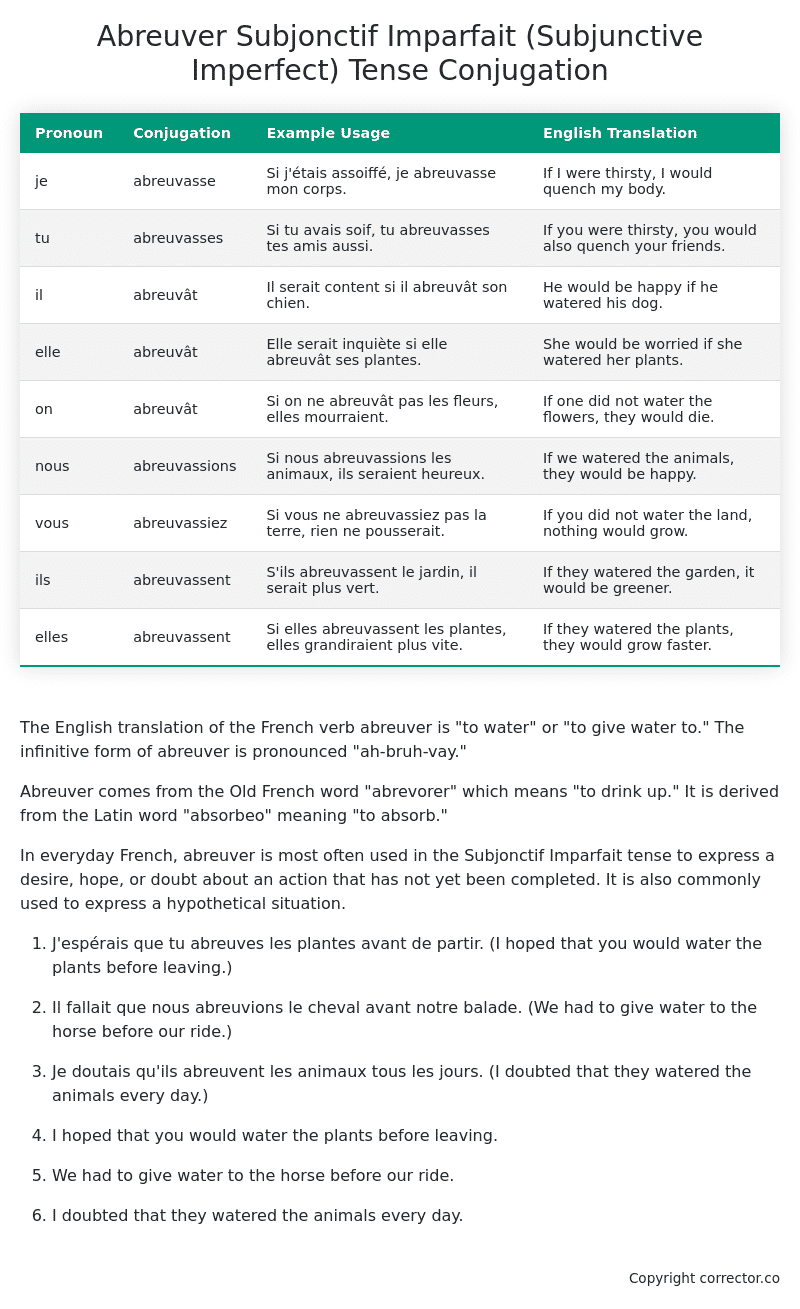Subjonctif Imparfait (Subjunctive Imperfect) Tense Conjugation of the French Verb abreuver
Introduction to the verb abreuver
The English translation of the French verb abreuver is “to water” or “to give water to.” The infinitive form of abreuver is pronounced “ah-bruh-vay.”
Abreuver comes from the Old French word “abrevorer” which means “to drink up.” It is derived from the Latin word “absorbeo” meaning “to absorb.”
In everyday French, abreuver is most often used in the Subjonctif Imparfait tense to express a desire, hope, or doubt about an action that has not yet been completed. It is also commonly used to express a hypothetical situation.
-
J’espérais que tu abreuves les plantes avant de partir. (I hoped that you would water the plants before leaving.)
-
Il fallait que nous abreuvions le cheval avant notre balade. (We had to give water to the horse before our ride.)
-
Je doutais qu’ils abreuvent les animaux tous les jours. (I doubted that they watered the animals every day.)
-
I hoped that you would water the plants before leaving.
-
We had to give water to the horse before our ride.
-
I doubted that they watered the animals every day.
Table of the Subjonctif Imparfait (Subjunctive Imperfect) Tense Conjugation of abreuver
| Pronoun | Conjugation | Example Usage | English Translation |
|---|---|---|---|
| je | abreuvasse | Si j’étais assoiffé, je abreuvasse mon corps. | If I were thirsty, I would quench my body. |
| tu | abreuvasses | Si tu avais soif, tu abreuvasses tes amis aussi. | If you were thirsty, you would also quench your friends. |
| il | abreuvât | Il serait content si il abreuvât son chien. | He would be happy if he watered his dog. |
| elle | abreuvât | Elle serait inquiète si elle abreuvât ses plantes. | She would be worried if she watered her plants. |
| on | abreuvât | Si on ne abreuvât pas les fleurs, elles mourraient. | If one did not water the flowers, they would die. |
| nous | abreuvassions | Si nous abreuvassions les animaux, ils seraient heureux. | If we watered the animals, they would be happy. |
| vous | abreuvassiez | Si vous ne abreuvassiez pas la terre, rien ne pousserait. | If you did not water the land, nothing would grow. |
| ils | abreuvassent | S’ils abreuvassent le jardin, il serait plus vert. | If they watered the garden, it would be greener. |
| elles | abreuvassent | Si elles abreuvassent les plantes, elles grandiraient plus vite. | If they watered the plants, they would grow faster. |
Other Conjugations for Abreuver.
Le Present (Present Tense) Conjugation of the French Verb abreuver
Imparfait (Imperfect) Tense Conjugation of the French Verb abreuver
Passé Simple (Simple Past) Tense Conjugation of the French Verb abreuver
Passé Composé (Present Perfect) Tense Conjugation of the French Verb abreuver
Futur Simple (Simple Future) Tense Conjugation of the French Verb abreuver
Futur Proche (Near Future) Tense Conjugation of the French Verb abreuver
Plus-que-parfait (Pluperfect) Tense Conjugation of the French Verb abreuver
Passé Antérieur (Past Anterior) Tense Conjugation of the French Verb abreuver
Futur Antérieur (Future Anterior) Tense Conjugation of the French Verb abreuver
Subjonctif Présent (Subjunctive Present) Tense Conjugation of the French Verb abreuver
Subjonctif Passé (Subjunctive Past) Tense Conjugation of the French Verb abreuver
Subjonctif Imparfait (Subjunctive Imperfect) Tense Conjugation of the French Verb abreuver (this article)
Subjonctif Plus-que-parfait (Subjunctive Pluperfect) Tense Conjugation of the French Verb abreuver
Conditionnel Présent (Conditional Present) Tense Conjugation of the French Verb abreuver
Conditionnel Passé (Conditional Past) Tense Conjugation of the French Verb abreuver
L’impératif Présent (Imperative Present) Tense Conjugation of the French Verb abreuver
L’infinitif Présent (Infinitive Present) Tense Conjugation of the French Verb abreuver
Struggling with French verbs or the language in general? Why not use our free French Grammar Checker – no registration required!
Get a FREE Download Study Sheet of this Conjugation 🔥
Simply right click the image below, click “save image” and get your free reference for the abreuver Subjonctif Imparfait tense conjugation!

Abreuver – About the French Subjonctif Imparfait (Subjunctive Imperfect) Tense
Formation
Common Everyday Usage Patterns
Interactions with Other Tenses
Subjonctif Présent
Indicatif Passé Composé
Conditional
Conditional Perfect
Summary
I hope you enjoyed this article on the verb abreuver. Still in a learning mood? Check out another TOTALLY random French verb conjugation!


